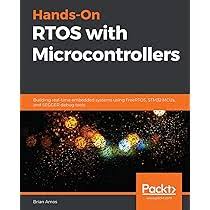White Paper: Advancing Embedded Systems through RTOS, Hardware-Software Codesign, and QEMU Emulation
Abstract
This white paper explores the integration of Real-Time Operating Systems (RTOS), hardware-software codesign methodologies, and QEMU-based emulation in embedded systems education, research, and industry applications. Drawing from academic trends and practical frameworks, including insights from Hands-On RTOS with Microcontrollers by Brian Amos, this document highlights how these technologies converge to support robust, real-time embedded solutions. We further explore use cases and how IAS-Research.com can support research institutions, startups, and enterprises in leveraging these technologies.
1. Introduction
Embedded systems are increasingly central to applications in IoT, aerospace, automotive, and medical technologies. The need for deterministic, reliable software behavior under tight timing constraints makes RTOS an essential component. Hardware-software codesign and emulation tools like QEMU enable rapid prototyping and system-level verification without physical hardware, improving development cycles and system reliability.
2. Key Technologies
2.1 Real-Time Operating Systems (RTOS)
RTOSs manage concurrent tasks in embedded systems with deterministic timing. FreeRTOS, discussed in-depth by Brian Amos, is a widely used open-source RTOS suitable for 32-bit microcontrollers like STM32. It allows abstraction, memory management, and safe task scheduling crucial for real-time applications.
2.2 Hardware-Software Codesign
Codesign integrates software development and hardware architecture from the early stages of system development. This approach:
- Reduces development time.
- Enhances design space exploration.
- Allows real-time deadline analysis and optimal partitioning between hardware and software.
2.3 QEMU Emulation
QEMU is an open-source machine emulator and virtualizer that supports embedded system simulation. Researchers have extended QEMU to support hardware/software co-simulation and custom co-processors, enabling:
- Early-stage development without physical hardware.
- Linux-based embedded platform simulation.
- Accelerated testing and debugging.
3. Academic and Industry Landscape
3.1 RTOS & Codesign in Academia
Universities such as Boston University and University of Tennessee at Martin integrate RTOS and hardware-software codesign into their embedded systems curricula. Research groups at Texas A&M and Arizona State University work on low-power SoC designs and provide infrastructure support through Research Technology Offices.
3.2 Practical Applications
In industry, RTOSs are critical in:
- Aerospace control systems (hard real-time).
- Medical devices (firm real-time).
- Automotive ECUs (soft real-time).
QEMU is used in continuous integration pipelines for embedded Linux systems. Hardware-software codesign is common in FPGA-based solutions, industrial robotics, and network-on-chip architectures.
4. Use Cases
Use Case 1: Industrial Robotics
Challenge: Need for real-time control of robotic arms with high precision.
Solution: FreeRTOS used to manage motor control and feedback loops; QEMU enables simulation of the embedded software stack.
IAS-Research.com Support: Offers custom FreeRTOS firmware development, system debugging with SEGGER tools, and QEMU-based prototyping.
Use Case 2: Smart Agriculture Sensor Network
Challenge: Power-efficient sensor nodes with local data processing and wireless communication.
Solution: Hardware-software codesign used to optimize data acquisition and communication tasks. RTOS ensures timely sampling and event handling.
IAS-Research.com Support: Provides embedded system design consulting and cross-platform code abstraction strategies.
Use Case 3: Safety-Critical Medical Devices
Challenge: Ensure deterministic behavior and meet regulatory requirements (e.g., IEC 61508).
Solution: Use of SafeRTOS (FreeRTOS variant) and verified middleware; simulation using QEMU to validate edge-case behaviors.
IAS-Research.com Support: Assists with certification-ready code development, testing automation, and documentation preparation.
Use Case 4: Academic Research Prototyping Lab
Challenge: Students require safe, low-cost access to embedded systems experiments.
Solution: QEMU configured to simulate STM32 MCUs with FreeRTOS; SEGGER Ozone used for visualization.
IAS-Research.com Support: Provides turnkey lab kits, remote firmware build/test pipelines, and educator support materials.
5. How IAS-Research.com Can Help
IAS-Research.com brings together embedded systems engineering, simulation expertise, and academic collaboration capabilities to empower innovation:
- Consulting & Training: Workshops on RTOS (FreeRTOS, CMSIS, POSIX), QEMU, and codesign methodologies.
- Prototyping Services: Embedded board selection, toolchain configuration (STM32CubeIDE, SEGGER tools), and firmware development.
- Simulation Infrastructure: QEMU-based labs, CI/CD automation, and debugging tool integration.
- Research Collaboration: Support in grant writing, curriculum design, and publishing case studies.
6. Conclusion
The convergence of RTOS, hardware-software codesign, and emulation platforms like QEMU is transforming how embedded systems are built and validated. With institutions and industry pushing the boundaries of real-time systems, IAS-Research.com offers technical leadership and hands-on support to accelerate innovation in this field.
References
- Brian Amos. Hands-On RTOS with Microcontrollers (Packt, 2020).
- Nelson Naia. "Using QEMU for Hardware/Software Co-Simulation" (University of Minho).
- Aarhus School of Engineering. "VDM-RT Codesign Methodology".
- https://github.com/PacktPublishing/Hands-On-RTOS-with-Microcontrollers
- https://rto.asu.edu
- https://codes.engr.tamu.edu



